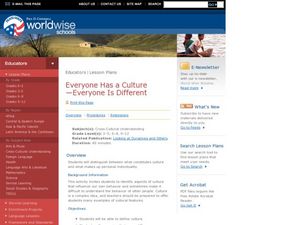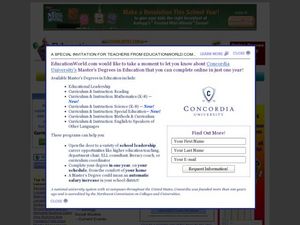Museum of Disability
Don't Call Me Special
Introduce young learners to the idea of disabilities and making friends with children who are different than they are. Using Don't Call Me Special - A First Look at Disability by Pat Thomas, learners are guided through the new...
Museum of Disability
Taking Down Syndrome to School
Teach your class about the ways they can befriend and understand people who are different from them with a reading comprehension lesson. As youngsters read Taking Down Syndrome to School by Jenna Glatzer, they answer a...
WITS Program
Whoever You Are
Deep down, everyone is the same. Discuss the similarities and differences between people across cultures with a series of reading activities based on the beautiful story and illustrations in Whoever You Are by Mem Fox.
Curated OER
How Are We Different?
Students discuss the differences between boys and girls. In this acceptance lesson, students view pictures of boys and girls and use a Venn Diagram to chart their differences. Students discuss boy activities and girl...
Super Teacher Worksheets
Accept and Except
Accept and except: although these two words sound similar, their meanings are very different. With a 10-question worksheet, grammar enthusiasts prove their understanding of the two commonly confused words by reading...
Museum of Disability
Stand Tall, Molly Lou Melon
Help to create the next generation of friends with a lesson about accepting people who are different. As kids read Stand Tall, Molly Lou Melon, they answer a series of discussion questions and activities about making friends...
Museum of Disability
Don't Laugh at Me
You can prevent bullying in your classroom by addressing kindness, empathy, and acceptance with your littlest learners early on. After reading Don't Laugh at Me by Steve Seskin and Allen Shamblin, kids discuss the ways that words...
San José State University
Commonly Misused Words
After reviewing two pages of commonly misused words: effect/affect, accept/except, there/their/they're, etc., learners must choose the proper word in ten different sentences. Note: Answers are listed at the bottom of page three.
Penguin Books
Wonder in the Classroom
Would you rather be right, or would you rather be kind? A novel unit based on R.J. Palacio's Wonder focuses on the need to be kind to others and to accept their differences. As learners read the book, they discuss the themes of...
Curated OER
Everyone has a Culture-Everyone is Different
Students explore cultural features. In this multicultural acceptance lesson, students define and discuss "culture," and distinguish the difference between individual characteristics and cultural characteristics. Students...
Museum of Disability
Can You Hear a Rainbow?
Teach your class about compassion and empathy with Jamee Riggio Heelan's Can You Hear a Rainbow? As kids read about Chris, a boy who is deaf, they discuss the things he likes to do, as well as the ways he communicates with the world.
Field Museum
The Case of Darwin's Finches
One of the most striking pieces of evidence for Darwin's Evolution of Species was his observations of finches and how their beaks differed from island to island, depending on their primary food sources. So what would happen to the theory...
Curated OER
Accept/Except
In this confusing words worksheet, students review the meanings of the words accept and except. Students then read examples of using the words correctly.
Curated OER
Physical Differences
Students role play what it would be like to have a physical disability. In this lesson on acceptance, students listen to the book A Rainbow of Friends by P.K. Hallinan. As a class, the students discuss similarities and differences in...
Curated OER
Arthur's Nose
Students read a story and complete a story map. In this diversity and acceptance lesson, students read Arthur's Nose, make a story map, research Aardvarks, complete a Venn Diagram comparing Arthur's nose to other animals in the...
University of New Mexico
Educating Culturally and Linguistically Diverse Students
Three mini units make up one large unit designed to explore multiculturalism and encourage cultural identity. Each lesson sparks thoughtful discussion, critical thinking, and are equipped with activities and assignments geared to...
Museum of Disability
Taking Visual Impairment to School
What is the world like when you can't see, or when your vision is impaired? Learn about how Lisa communicates with the world around her with Taking Visual Impairment to School by Rita Whitman Steingold. Learners answer...
Penguin Books
A Teacher's Guide to Lord of the Flies by William Golding
Many critics consider William Golding's Lord of the Flies as one of the best English language novels of the 20th century! It is also one of the 100 most challenged books taught in schools! Instructors willing to accept the challenge of...
Film English
Stand Up
To stand up can have many different meanings. Examine the different usages in English and relate one of these meanings to a short film about homophobic bullying. Class members view and discuss the film as well as a short reading passage...
Chandler Unified School District
Satire: The Art of Indirect Persuasion
A free press is entitled to its opinions. While the news pages report the facts of events, editorial pages feature writers' and cartoonists' opinions about events to either directly or indirectly persuade. Introduce viewers to the art of...
Curated OER
Acting Out Respect
Fifth graders explore, analyze and study interacting with others in ways that respect individual and group differences. They assess how to exhibit mutual respect and compromise in relationships through a teacher and counselor scenario...
Curated OER
Commonly Misused Words
Affect or effect? Ensure, insure or assure? Here’s a presentation that focuses on commonly misused words that sound similar yet have different spelling and meanings. The homonyms are defined and then examples are presented. Consider...
Curated OER
Bad Case of Stripes Lesson Plan
Students think about why we worry about what others think, bullying, and learning to respect and accept differences in others.In this Bad Case of Stripes lesson plan, students examine cause-and-effect relationships in a story as they...
Curated OER
"Little" Brothers Share Big Bond
Students listen to the story Little Brothers Share Big Bond and answer comprehension questions. In this lesson on acceptance, students use various areas of reading (vocabulary, fluency, comprehension) to promote compassion and an...

























